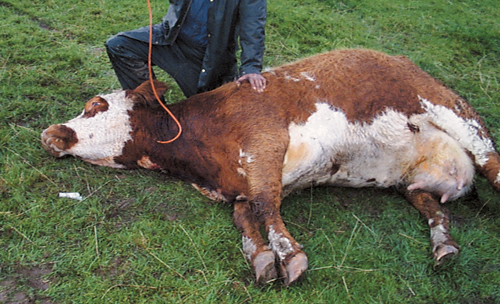Cattle Medicine Q&A 08
| This question was provided by Manson Publishing as part of the OVAL Project. See more [[:Category:{{{book}}}|{{{book}}}]]. |
After a stormy autumn night you are called to attend a recumbent 10-year-old Simmental-cross-Friesian beef suckler cow that calved 36 hrs ago. The cow is at pasture with a group of predominantly summer-calving cows which is receiving no supplementary feeding other than barley straw in a ring feeder. The cow was found by the farmer to be in lateral recumbency and ‘thrashing wildly’. When you arrive the cow appears quiet but clinical examination precipitates seizure activity.
| Question | Answer | Article | |
| What conditions would you consider? (Most likely first.) | The most likely conditions to consider include:
|
Link to Article | |
| What treatment would you administer immediately? | While unlicensed for use in cattle, 6–8 mL of 20% pentobarbital solution injected intravenously controls seizure activity a great deal more effectively than either diazepam or xylazine. The cow is then haltered and 50 mL of 25% magnesium sulphate is added to a bottle of 400 mL of 40% calcium borogluconate solution and given by intravenous injection over 10 minutes. |
[[|Link to Article]] | |
| What samples would you collect? | A serum sample for calcium and magnesium concentrations should be collected in case the cow does not respond to treatment.
|
Link to Article | |
| What control measures could be adopted for the remainder of the herd? | The farmer was advised to start feeding 2 kg per head per day of highmagnesium concentrates immediately. Good-quality barley straw should also be available ad libitum.
|
[[|Link to Article]] | |
